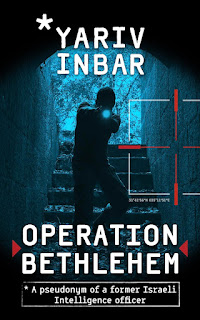Yariv Inbar is the author of the novel Operation Bethlehem, which is now available in an English-language translation from the Hebrew by Dalit Shmueli. Yariv Inbar is a pseudonym of a former Israeli intelligence officer.
Q: What inspired you to write Operation Bethlehem?
A: The book raises an important question about the legitimacy of using intelligence entities to deal with non-security issues. The Israeli intelligence community has been involved in various non-security matters, such as smuggling Torah scrolls, retrieving historical artifacts, and bringing Jews to Israel. I was curious to know if it's worth putting intelligence operators at risk for such purposes and who actually makes the decision about it.
While planning the book's plot, I remembered a documentary I watched in 2007 that fascinated me long before I became an author. It was on the History Channel and called God's Gold. It followed the journey of British archaeologist Dr. Sean Kingsley, who sought lost temple treasures around the world.
According to Kingsley, Mar Theodosius, a Greek Orthodox monastery east of Bethlehem, held the secret hiding place of one of antiquity's greatest treasures: the gold and silver vessels from the Temple in Jerusalem. However, the documentary team was not allowed to film inside the monastery by the Palestinian police and the monastery nuns. This ignited my imagination about how one could investigate the location covertly.
Over time, this idea inspired many others, fueling the creation of the novel. However, I replaced the original monastery with a real psychiatric hospital in Bethlehem. You can think about the book as a fictional story that never happened, but it could have.
Q: You write under a pseudonym because of your experiences in Israeli intelligence. Can you say anything about the vetting process your writing needs to go through before it's published?
A: This topic has a unique influence on my writing. Moreover, I wonder whether many other authors in the world undergo such a process.
In Israel, any author who has held sensitive positions within the intelligence community and writes books in this realm—albeit fictional—must submit their manuscript for review and approval before publication. Initially, the manuscript is presented to the chief censor, who provides input.
Subsequently, the manuscript is sent to Israel's intelligence organizations, including the Ministry of Defense, for their respective comments. A special ministerial committee, presided over by the Minister of Justice, convenes to deliberate on the feedback from these entities. This committee then issues directives regarding the necessary manuscript changes before approving publication.
In my case, the ministerial committee opted to prevent me, at this stage, from disclosing my true identity and name. The committee's feedback is often demanding, requiring multiple text revisions.
Q: Did you know how the novel would end before you started writing it, or did you make many changes along the way?
A: Generally speaking, the answer is yes. Before starting to write a story, I usually create a skeleton. This helps me to convey the message I want to get across through the plot. However, as soon as I start writing and the characters come to life, I make changes along the way. This is because I get to know my characters better and understand what is natural for them to do and what isn't.
Q: Did you need to do any additional research to write Operation Bethlehem?
A: In writing my book, I conducted extensive research on Bethlehem and its psychiatric hospital. Many of the characters and places described in the book were inspired by real people and locations. I also delved into the background of the violent events that occurred at “Warren's Gate” on the Temple Mount during the summer of 1981.
As an Israeli who was born and raised in the country, I also had to learn about the experiences and perceptions of Jewish immigrants to Israel.
Q: What are you working on now?
A: During the past year, I decided to take a break from writing and focused on translating my books into English. We have already translated two books, and both will be published in 2024. But I am planning to start writing a new book soon.
Q: Anything else we should know?
A: Yes, I believe I speak for many writers, not just myself when I say that it is important for us to hear about the reading experience of our readers. When you finish a book, consider taking a few minutes out of your time to write to us. This feedback is invaluable and serves as our true compensation. Thank you.
--Interview with Deborah Kalb

No comments:
Post a Comment